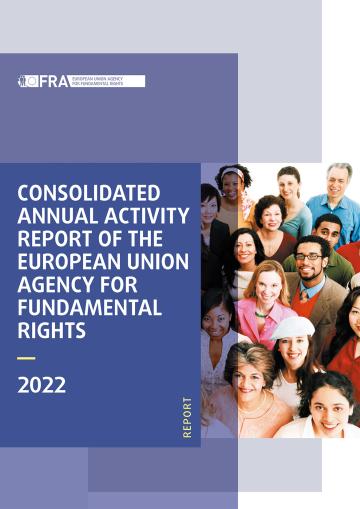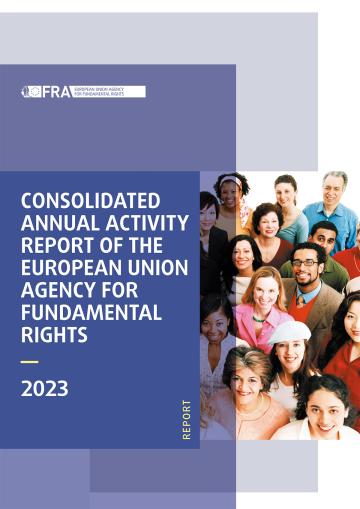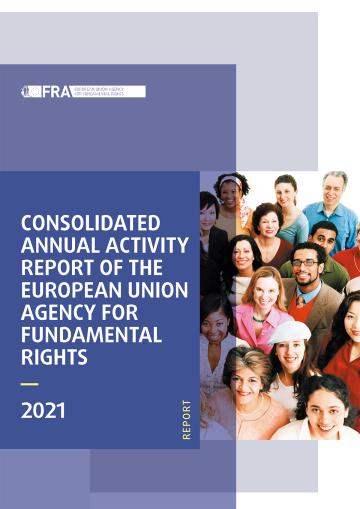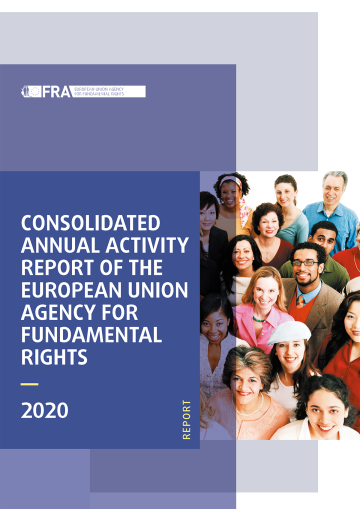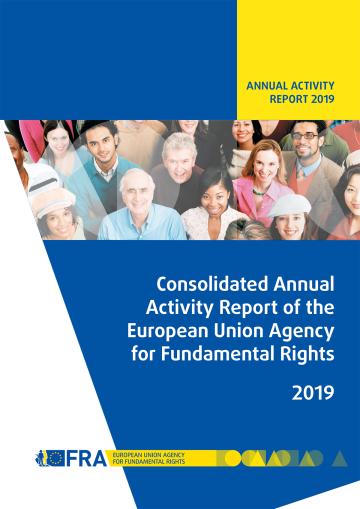Achievements in 2022
1. Identifying trends: collecting and analysing comparable data and evidence
In the 2018–2022 period, the agency further enhanced its work in collection and analysis of data, especially among hard-to-reach population groups. FRA has built upon qualitative and quantitative research analysis to continue identifying fundamental rights trends in specific areas.
In 2022, FRA continued to publish comparable, robust and reliable data and evidence on fundamental rights. This was highly valued by stakeholders and was used in the implementation of legislation and policies at EU level.
- FRA published its annual update on antisemitism, providing an overview of antisemitism incidents recorded in the European Union from 2011 to 2021.
- FRA published the results of its Roma Survey 2021 at the 15th Roma Platform, held under the Czech Presidency of the Council of the European Union, to contribute to the monitoring of the EU’s 10-year plan to support Roma.
- The report Bias in algorithms – Artificial intelligence and discrimination was praised by stakeholders for showcasing FRA’s ability to research innovative and timely topics.
- FRA continued to facilitate the work of the Commission’s subgroup on equality data, in particular through a draft guidance note on the collection and use of data for lesbian, gay, bisexual, trans, intersex and queer (LGBTIQ) equality.
Stakeholders surveyed as part of the 2022 stakeholder consultations largely used FRA outputs, including publications, for advocacy, awareness-raising and research purposes.Of the surveyed stakeholders, 84 % used FRA’s outputs for research purposes and 76 % for awareness-raising purposes. Furthermore, a very large majority of surveyed stakeholders agreed that FRA’s reports are useful, relevant, reliable and timely (86–100 % of surveyed respondents). A total of 86 % of surveyed stakeholders stated that FRA publications they had accessed had contributed to a higher level of understanding of relevant fundamental rights trends.
2. Contributing to better law making and implementation by providing independent advice
In the 2018–2022 period, building upon comprehensive and evidence-based opinions, the agency strengthened its position as an expert body that fulfils its mandate towards fundamental rights stakeholders in the EU. The regular incorporation of FRA’s advice into EU legislative documents attests that the agency is an influential actor. FRA was particularly effective in providing legislative and policy advice on matters relating to asylum, migration and borders.
In 2022, FRA contributed to better law making and the implementation of laws on children and migrants, and in the area of equality and migration.
- In June 2022, FRA published the findings of its research on Children as suspects or accused persons in criminal proceedings - Procedural safeguards. The report looked at the practical implementation of Directive (EU) 2016/800 on procedural safeguards for children who are suspects or accused persons in criminal proceedings.
- FRA finalised its research on the implementation of the Victims’ Rights Directive (2012/29/EU) to support the preparatory work of the European Commission on the revision of that directive.
- FRA disseminated its research findings included in the report on Directive (EU) 2017/541 on combating terrorism — Impact on fundamental rights and freedoms.
- At the request of the European Commission, FRA developed guidance for the establishment of independent mechanisms to monitor fundamental rights compliance at borders
- FRA continued its research with data protection authorities to support the European Commission’s second evaluation of the General Data Protection Regulation (2016/679/EU) (GDPR).
- FRA expanded its work in the area of security, with FRA’s Director invited to present at the European Police Chiefs Convention and FRA’s attendance at Europol’s Innovation Hub.
- FRA’s expertise on artificial intelligence (AI) was recognised, with an invitation as an observer as part of the EU delegation to the CoE, which is developing a treaty on the topic.
3. Supporting rights-compliant policy responses: providing real-time assistance and expertise
In the 2018–2022 period, the agency provided key support to EU institutions, agencies and Member States through evidence-based advice, including in situations where there is an urgent need for FRA’s input such as the COVID-19 pandemic, the migrant crisis and the Russian war of aggression against Ukraine. FRA has provided key deliverables and expertise, and identified risks, for EU stakeholders to achieve this priority’s underpinning objectives.
In 2022, FRA reacted quickly to the Russian invasion of Ukraine and was one of the first EU agencies at the border, monitoring the situation. It produced its first report within one month of the invasion, providing first-hand evidencebased information and advice to EU institutions and international organisations, such as the European Commission’s Blueprint Network. This was followed by five data collection and analysis actions:
- two bulletins examining the fundamental rights implications of the war;
- an online survey of the experiences of displaced persons fleeing Ukraine;
- interactive map of the work of cities in response to the crisis;
- mapping how Member States are implementing the Temporary Protection Directive (2001/55/EC);
- planning a survey on experiences of violence among women fleeing the war.
Stakeholders praised the bulletins, in particular, as evidence of FRA’s timely response to emerging fundamental rights issues.
At the launch event for the CoE’s new Strategy for the Rights of the Child in February 2022, FRA published its report on Guardianship systems for unaccompanied children in the European Union: Developments since 2014, as well as the 2022 edition of its Handbook on European law relating to the rights of the child. It continued to release new tools and translations to build stakeholder capacity in relation to the EU Charter of Fundamental Rights.
FRA co-chaired the Frontex Consultative Forum and attended Frontex Management Board meetings, providing fundamental rights expertise to the European Border and Coast Guard Agency.
4. Effectively promoting rights, values and freedoms
In the 2018–2022 period, FRA engaged in activities to foster a new human rights-based narrative by developing effective communications, engaging in the development of new digital applications and tools, and bringing together human rights actors to promote European values and freedoms.
FRA organised a range of events, including the fourth Fundamental Rights Dialogue with young people, as well as other workshops and webinars. The residential Human Rights Leaders and Experts Meeting in Rust, Austria, was a particular highlight, bringing together 60 diverse stakeholders to discuss three major challenges: the climate crisis, the rise of disinformation and Russia’s war of aggression against Ukraine. The report Putting human rights at the heart of Europe’s future distils this meeting’s discussions.
In the reporting year, the media published over 4,300 articles about FRA’s work, with topics relating to LGBTIQ issues, antisemitism and violence against women being FRA’s most referenced themes in the media. FRA’s Roma survey report, the AI and discrimination report, the second bulletin on the fundamental rights impact of the Russian war of aggression against Ukraine and the agency’s annual update on antisemitism generated the widest media interest in 2022. Social media promotion also centred on these reports and on relevant international days. Furthermore, the engaging ‘Our data is your ally’ campaign explained how FRA data and evidence can be used in a range of thematic areas. The campaign showcased FRA’s capacity to tailor audiovisual content to young people, as well as raising its profile among that group.
Over two thirds (66%) of stakeholders surveyed as part of the 2022 stakeholder consultations reported that FRA’s 2022 publications have directly influenced their work and ability to promote fundamental rights.
5. Strengthening cooperation with national and local fundamental rights actors: working with communities of support
In the 2018–2022 period, FRA empowered national human rights infrastructure. This was achieved through the provision of tailored capacity building, by cooperating with and creating synergies with human rights institutions, and by developing FRA’s communities of support at Member State level. For example, in the reporting year FRA carried out a mapping exercise of experts on the EU Charter of Fundamental Rights and of training options on fundamental rights across the EU, and provided an update on its overview of national human rights institutions (NHRIs) to include recent developments in NHRI accreditation status and mandates.
In 2022, FRA increased its knowledge and data on fundamental rights within the Member States. Throughout the year, it contributed to developing a human rights culture and strengthening the capacity of civil society in the Member States, primarily through its work with NHRIs and cooperation with civil society organisations (CSOs). The Fundamental Rights Platform, the agency’s key interface with CSOs, this year focused on how CSOs can best contribute to strengthening the rule of law in their Member State, and on what can be done to support them in this endeavour. FRA also facilitated capacity building and offered methodological advice on data collection and analysis to Member States.
Further areas of focus this year were supporting the national implementation of the EU action plan against racism, engaging with the Collaborative Platform on Social and Economic Rights, and supporting equal treatment of all age groups in response to Europe’s changing demographic landscape, through activities such as the #OurDataYourAlly campaign, the Fundamental Rights Dialogue, attendance at the AGE Platform annual conference, and the publication of a comparative report on ageing in digital societies and social rights.
